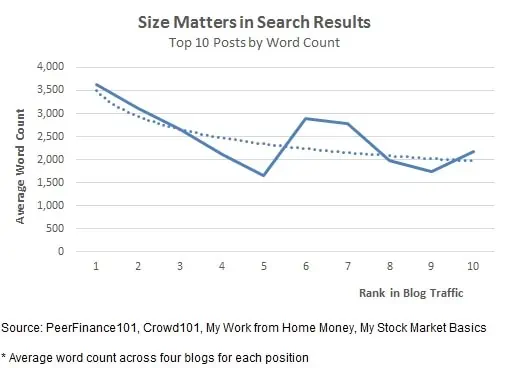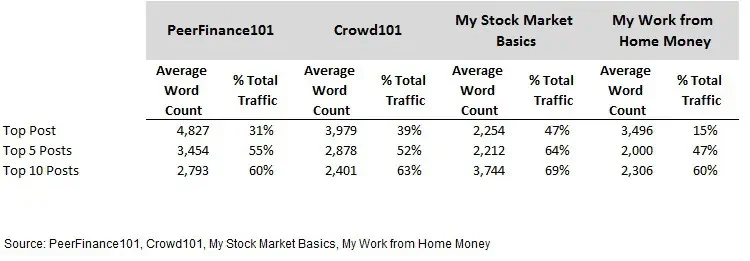Content length versus posting frequency, which is more important for Google search traffic?
I’ve always tried to post at least twice a week on each of the six blogs I own, believing that it was the best way to get that Google search love that we bloggers depend on.
Posting frequently does a few important things for your blog.
- Increases the keywords you can rank for in search
- Gives readers lots of ideas and helpful tips, keeping them coming back for more
- Tells the Google spiders, those beautiful little bots that search the web to index pages for search results, to come back frequently for new content
Combining that frequency of posting with the other SEO tips I share on the blog has helped double the page views over the last year on my PeerFinance101 site and increased visitor traffic by 145% on my crowdfunding blog.
I always thought I had it down until I looked at some of my most popular posts by traffic. The chart below shows the average word count of the top ten posts on four of my blogs.
My number one most trafficked post averages over 3,600 words and accounts for 33% of the page views. The average word count of the top five posts is over 2,600 words and just those five posts account for 55% of total page views.
For reference, the average word count on all my posts across all four blogs is about 1,100 words. So the top five posts on my blogs, accounting for more than half the traffic, are more than 2.5 times as long as regular posts.
The dilemma in all of this if you haven’t picked up on it is which is more important to grow a blog, posting frequency or content length?
Of the 220 posts on one of the blogs, 172 of them accounted for just 5% of the traffic. Did I waste my time writing them and is there a better way to maximize your time as a blogger?
The Frequency versus Content Length Tradeoff in Blogging
The fact is there is a trade-off between the number of times you post each week and content length for each post. If I’m posting 12 times a week to six blogs and each post is just over 1,100 words, that means writing over 13,000 words a week in addition to freelance projects.
Well Joe, maybe you shouldn’t have six blogs!
I like running multiple sites. It gives me the opportunity to monetize more affiliates and talk about different topics instead of always being stuck in a narrow niche.
But even if you only run one blog, trying to write multiple large posts a week can still be a lot of writing.
Notice we’re talking about post length here instead of ‘quality versus quantity’ in blogging. All your posts should be researched and well-written. You can have shorter articles of very high quality just as well as the mega-posts…but longer posts just seem to bring in much more traffic than shorter posts.
So do you and your budding internet empire sacrifice frequent posts for longer articles? Are you just wasting your time writing articles under 2,000 words?
The answer can mean a huge difference in the search traffic to your blog and how much money you make…so, yeah it’s a pretty important question.
What do we know about Google Search?
Let’s look at what we know about Google search, or more appropriately, what we think we know. Google is pretty tight lipped about its ranking algorithm so we have to go off of third-party research.
We know that Google has a Query Deserves Freshness (QDF) ranking factor in its algorithm that prefers new content over old. This is presumably to show searchers news and updated information. That means frequent content has a better chance of getting picked up.
It’s also intuitive that writing more posts gives you a better shot of optimizing for more keywords and maybe even seeing one of those posts go viral.
Neil Patel saw his traffic jump 30% when he increased to two posts per week from just one. He started posting six times a week instead of five on KISSmetrics and saw a 19% gain to 501,573 visitors a month!
But we also know something about content length of top search results. SerpIQ researched the top ten results in Google and found an average word count of over 2,000 across the board.
In fact, the top five search results have an average of over 2,300 words!
What started me thinking about post length?
With six blogs to post on and a major freelance contract that started in July, I had to take a serious look at posting frequency and figure out what was best for the blogs.
I knew that some of my top performing posts were also some of my longest.
But then I looked at all the data and was shocked what I found.
I downloaded my page views per post for the last month from Google Analytics (Behavior>Site Content>All Pages). I did this for four blogs and then went through the top 10 posts on each blog to check word length.
Here’s what I found:
Not only were my most popular posts much longer than the average-sized article but the top ten posts were all much larger and accounted for two-thirds of my total traffic. Since Google search accounts for my single largest traffic source, from about 45% to 75% on one blog, it’s a pretty good bet that size matters in search!
Can you imagine what search traffic would look like if almost all of my posts were longer content and got as many Google visitors?!
There are a lots of reasons why content length rules Google search rankings:
- Longer posts are usually more detailed so they are likely to hit many different long-tail keyword phrases that are easier to rank
- These mega-resource posts offer more to readers and generally get more links, shares and comments…all powerful signals for Google ranking
- Longer posts mean a longer dwell time, the time a reader stays on your page, also an important Google ranking factor
My New Blogging Strategy
So I’m now switching to just one post a week for each blog and a mega-super post every 4-6 weeks on each. Instead of writing 12 posts for a total of around 13,000 words a week (> 56,000 words a month), I’m planning on writing six posts for about 6,600 words a week plus six 4,500 word posts a month.

We’ll have to see how the strategy works and I’ll be sure to update you on progress over the next few months.
I’m already lovin’ the strategy though. Writing longer posts means more research on each but a lot less overall time compared to pumping out those extra 20 articles. Each article needs its own keyword research, image optimization, SEO and a bunch of other tasks that can really add up.
Spending more time to rank one article as opposed to trying to rank a bunch of little articles may turn out to be the smart (pronounced: profitable) way to go as well. If you’re not ranking an article then you’re not getting traffic and you’re not making any money. I’d rather rank one article and include some affiliate links than listen to crickets chirping with many articles on page five of Google.
I’d love to hear your thoughts on the posting frequency versus length debate in blog ranking. Have you looked at the content length on your most popular posts? How often do you post and have you ever changed posting frequency to see how a different strategy worked?
Want more tips for ranking your blog on Google and getting massive traffic?
- Top 10 List of On-Page SEO Tricks to Rank Fast
- 128 Sites to Boost your Web Ranking with Links
- Internal Linking and the Hub-and-Spoke Blog Strategy
By the way, I’m fully aware of the irony that an article about posting frequency versus content length is only sitting at about 1,300 words. I’ve included a pretty detailed review of Google ranking on content length and blog frequency and didn’t feel the need to drone on for another few thousand words. Maybe the post won’t end up ranking highly in SERP but those that read it will definitely have something to think about!




